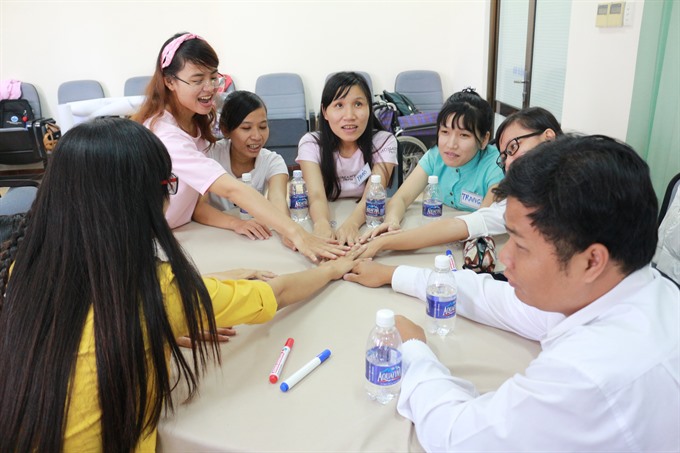 Society
Society

Support service centres for students with disabilities have been set up at the HCM City Pedagogy University and HCM City University of Social Sciences and Humanities.
 |
| Students with disabilities attend a life skills training course. — Photo courtesy of the Disability Research and Activities Capacity Development Centre in HCM City. |
HCM CITY — Support service centres for students with disabilities have been set up at the HCM City Pedagogy University and HCM City University of Social Sciences and Humanities.
The centres are part of the “Disability Access Route to Education” project being implemented by the Disability Research and Activities Capacity Development Centre (DRD) from January 2016 to December 2018.
The main goal of the project, which is funded by Irish Aid, is to empower students with disabilities at the two universities so they can fully participate and contribute to society, Lưu Thị Ánh Loan, acting director of DRD, said.
The HCM City Pedagogy University has the highest number of students with disabilities among universities in the city, with a total of 45 students, including 26 who are visually impaired, according to DRD.
The students currently receive support such as scholarships, laptops and computers from sponsors, but the support is only seasonal.
As part of the project, from April to December 2016, the mentors of two partner universities assessed the needs of 45 students with disabilities.
Regarding their needs, students with disabilities have various demands and expectations, with skills training named as their top priority, followed by assistance with internships and employment; mobility support; learning devices; and social activities.
Based on individual plans of students with disabilities and suggestions from mentors, the project delivered support packages to help them with their studies.
The support included 32 monthly scholarships worth VNĐ500,000 (US$22) each; 10 laptops, nine recorders and eight scholarships to study English; and four skills courses such as mobility orientation for the blind, communication and presentation, leadership and teamwork, and CV writing and interviewing skills.
Students with disabilities also received books, soft skills training, speech therapy and physical therapy.
Disability equality trainings were organised to help university staff and lecturers have a better understanding of disability issues and to develop strategies to provide more support for students with disabilities. — VNS




